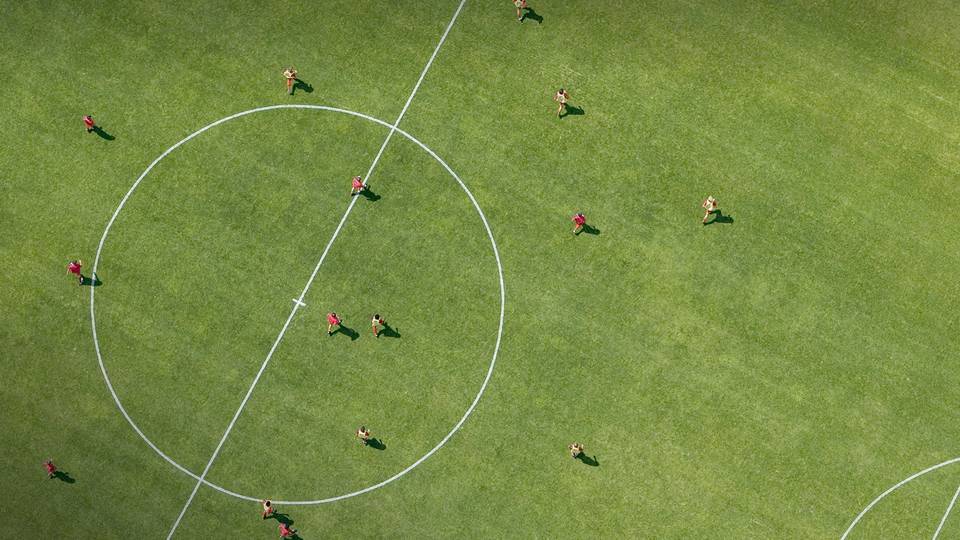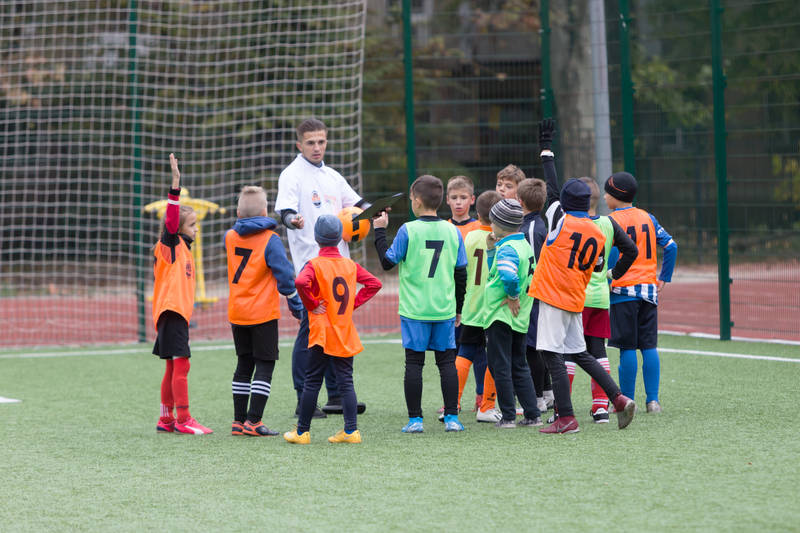Coaching U7 football requires a blend of patience, planning, and playfulness to develop young players effectively. Children at this age are just beginning their football journey, making it crucial to focus on fundamental skills while keeping sessions enjoyable and engaging. Effective U7 coaching involves creating structured yet flexible training plans that balance technical development with fun activities to maintain interest and enthusiasm.
Planning your U7 football sessions in advance helps ensure productive training time with this energetic age group. Spend an hour before each training session designing activities that cover various skills—including ball mastery, basic passing, and movement exercises. These young players typically have limited attention spans, so keeping drills brief and varied helps maintain focus throughout the session.
The most successful U7 football training incorporates games that naturally teach football concepts while children simply think they're having fun. Short-sided games, obstacle courses, and imaginative scenarios like "shark attack" dribbling exercises develop crucial skills without feeling like traditional drills. Soccer-specific movements embedded in playful contexts help young players build coordination and confidence with the ball at their feet while fostering a lasting love for the sport.
Fundamentals of U7 Football Coaching
Coaching U7 football requires understanding young players' developmental needs and focusing on establishing core skills in a fun environment. Success comes from balancing skill development with age-appropriate activities that keep children engaged and excited about the sport.
Understanding the U7 Player
Children at U7 are typically energetic but have limited attention spans. They learn primarily through play and need activities that change frequently to maintain interest.
Their physical development is still in early stages, with coordination still developing. Large movements come more naturally than fine motor skills.
U7 players are often egocentric in their thinking. They may bunch around the ball rather than maintain positions, which is completely normal at this stage.
They respond well to positive reinforcement and simple, clear instructions. Demonstrations work better than lengthy explanations.
Most importantly, they need to have fun. If training sessions aren't enjoyable, they'll lose interest quickly regardless of skill development.
Building Basic Skills and Coordination
Focus on four fundamental skills at this age: dribbling, basic control, simple passing, and shooting. Each session should incorporate elements of all these skills through varied activities.
Essential drills for U7 players:
- Ball mastery exercises using both feet
- Simple obstacle courses to improve dribbling
- Basic 1v1 activities to develop confidence
- Short passing games in small spaces
Coordination development is crucial at this stage. Include activities that develop balance, agility and basic motor skills alongside football-specific exercises.
Incorporate games that use different parts of the foot to control the ball. This builds technical foundations while improving coordination.
Keep competitive elements friendly and low-pressure. Small-sided games (3v3 or 4v4) are ideal as they maximise ball touches and involvement.
Remember that repetition builds confidence. Revisit similar activities regularly while adding small variations to keep sessions fresh and engaging.
Designing Effective Practice Sessions
Effective practice sessions for U7 football require thoughtful planning and age-appropriate activities that balance fun with learning. Coaches should focus on creating engaging environments while implementing structured drills that develop fundamental skills.
Creating a Positive Learning Environment
Young players thrive in environments where they feel safe and encouraged. Coaches should use positive reinforcement and celebrate small achievements to build confidence.
Sessions should begin with a warm welcome and a brief, simple explanation of the day's activities. Keep instructions clear and concise, using demonstrations rather than lengthy explanations.
Equipment should be colourful and appropriately sized for small hands and feet. Mini goals, small footballs, and bright cones create an inviting setup that captures children's attention.
Game-based activities work best for this age group. Tag games that incorporate dribbling skills or treasure hunts that involve passing can make learning enjoyable while developing core skills.
Remember that U7 players have limited attention spans. Plan 5-6 different activities lasting 5-10 minutes each to maintain engagement throughout the session.
Structured Practice for Skill Development
Effective U7 practice sessions follow a clear progression that builds from simple to more complex activities. Begin with basic movement exercises before introducing the ball.
Incorporate fundamental skill development in every session. Focus on dribbling, stopping the ball, and simple passing techniques. These core skills form the foundation for future development.
Small-sided games (1v1, 2v2) should feature prominently in your sessions. These mini-matches allow more touches on the ball and create natural decision-making opportunities without overwhelming young players.
Include directional activities where possible. Even at U7 level, players benefit from understanding the concept of attacking and defending in simplified formats.
Key session components:
- Warm-up games (5 minutes)
- Skill practice (10-15 minutes)
- Small-sided games (15-20 minutes)
- Cool-down activity (5 minutes)
Coaches should record which skills they've covered to ensure balanced development across the season. Revisiting key techniques regularly helps reinforce learning while introducing subtle variations maintains interest in the soccer curriculum.
Player Development and Progression
At U7 level, players build upon the foundation established in earlier years while developing new skills that prepare them for future challenges. Effective coaching at this stage creates the framework for long-term player development through age-appropriate training and progressive skill introduction.
Transitioning from U7 to U8
The transition from U7 to U8 represents a crucial developmental period where players begin to understand more complex aspects of the game. Coaches should gradually introduce positional awareness and basic tactical concepts while maintaining focus on fundamental skills.
Children at this age benefit from activities that incorporate decision-making elements. Simple defending principles can be introduced through fun games that encourage players to protect space or track opponents.
Training sessions should include more structured small-sided games (3v3 or 4v4) that allow players to apply their developing skills in match-like scenarios. These games provide natural opportunities to learn about spacing and teamwork.
Progress should be measured individually rather than through team performance. Each child develops at different rates, so personalised feedback is essential for confidence-building and skill enhancement.
Advancing Player Performance Through Training
Effective training at U7 level combines technical skill development with enjoyable, engaging activities. Practice sessions should focus on ball mastery, basic dribbling techniques, and simple passing exercises that build coordination and confidence.
Coaches should implement varied drills that develop both dominant and non-dominant feet. Short, focused activities with regular rotation keep young players engaged and maximise learning opportunities.
Creating game-realistic scenarios helps children transfer skills from practice to matches. Small challenges and achievable targets motivate players while building resilience and problem-solving abilities.
Regular skills circuits offer excellent development opportunities. These might include:
- Dribbling through cones
- Basic 1v1 defending exercises
- Simple passing patterns
- Shooting activities with minimal pressure
Remember that young players learn best through guided discovery rather than excessive instruction. Ask questions and encourage self-expression rather than demanding specific actions during training sessions.
Responsibilities of U7 Football Coaches
Coaching young children at U7 level requires specific skills and approaches that differ from coaching older players. Coaches must prioritise safety, development and enjoyment while creating an environment where children can build early football foundations.
Ensuring Safety and Well-being
The primary responsibility of any U7 football coach is to ensure the safety of all players. Coaches must conduct thorough pitch inspections before every session to identify and remove potential hazards.
Equipment must be age-appropriate and in good condition. For U7s, lighter balls (size 3) should be used to prevent injuries and make control easier for small feet.
Coaches should possess basic first aid knowledge and always have a first aid kit accessible. An awareness of each child's medical conditions is essential.
Weather conditions must be carefully monitored. Young children are particularly vulnerable to extreme temperatures, so sessions should be modified accordingly with frequent water breaks during hot weather.
Training activities must be developmentally appropriate. Avoid physical contact drills that might intimidate or harm young players.
Role of Coaches in Promoting Teamwork
U7 coaches play a crucial role in developing early teamwork skills that will benefit children throughout their football journey. Simple concepts like passing to teammates should be encouraged through fun games rather than strict tactical instructions.
Coaches should create opportunities for all children to interact with different teammates during training. Rotating partners during activities helps children develop social skills and prevents cliques from forming.
Positive reinforcement is vital. Praise children who demonstrate good teamwork, such as helping a teammate or sharing the ball.
Communication skills should be gently developed. Encourage children to call for the ball and respond to their teammates' calls during games.
Team-building activities that don't necessarily involve a ball can be valuable. Simple games that require cooperation help children understand the importance of working together.












